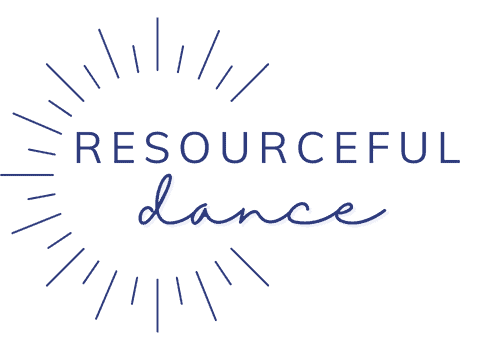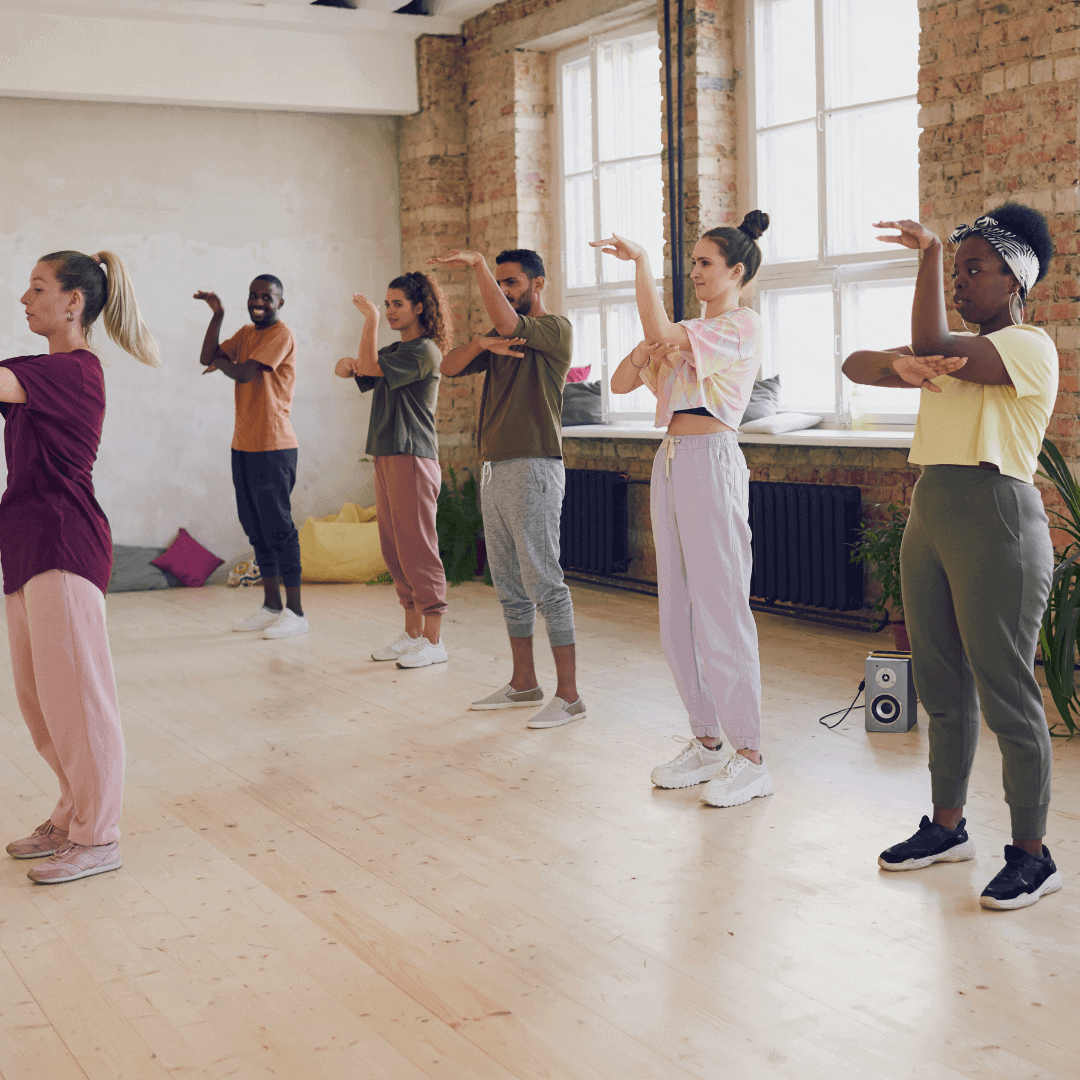I LOVED dancing in college. While I would like to say that I carefully researched and considered the items below- what really happened was I followed my high school boyfriend, decided to major in dance at the last minute, and was SUPER lucky that I fell into an outstanding program (shout-out to the University of Iowa Dance Department!).
Over the years, Colleen and I have had many conversations with families and students about college dance. We also tried to create an environment within our studio where we talked about options after high school and encouraged our students to think about those options. I strongly believe that if you WANT to continue dancing after high school you can. It may look different for different people- but there is a way to keep dance in your life.
I could go off on a long rant (I’ll save it for another day!), but I think currently there is a disconnect between what happens inside most dance studios, what happens within college dance (or pre-professional) programs, and what happens in the professional world. One of the ways we can help to close that gap is by helping students to understand the process and how their training, and relationship with dance may change along the way.
Teaching students to be open to new ideas is SO important to their success as dancers. I danced with many beautiful dancers in college who couldn’t make the transition because they were so caught up in how “different” it was then their high school experience. It was to my benefit that I entered college a little technically behind some of my peers because I was open-minded and hungry for more. High school dance does not have to be your peak- know that you have more to give.
As a dance studio owner and teacher, talk with your students about the future. Expose them to diverse examples of professional dance. Send a message that different is OK! Your way and the way you run the studio are not the ONLY way. Make sure they know that there is a place for them in the dance world if they want it!
So today, I’ve put together a list of things for dance studio owners, teachers, parents, and students to consider when selecting a college dance program.
A lot of these considerations would also apply to evaluating summer programs or pre-professional programs. Audition season is upon us! Happy searching! I also recommend checking out the Dance Magazine College Guide for searching programs.
Things to Consider:
What do you want out of your college dance experience?
What are your expectations? Are you planning on dancing in college because you simply enjoy it or are you hoping to continue dancing after college as a professional? How competitive of an environment are you looking for? Start with these questions and try to be very honest with yourself. Reflect on your current studio situation. Are you happy with the environment there or do you wish you would have sought out something different? There are no right answers- but your answers will change the type of program that is best.
A simple way to gauge how competitive the environment is is to see if the program requires auditions. You can also look at how many dancers they accept from those auditions. If the program is competitive to get into- odds are it is also going to be competitive to get roles and attention once you are in.
What disciplines does the program offer?
An even better question would be what disciplines are the FOCUS of the program. Most programs offer a wide range of dance styles- but they may only offer certain styles as electives or non-major courses. If you are a serious tap dancer you need to make sure you are looking into a program with multiple levels of tap that are being taught by professors.
Most college dance programs focus on ballet and modern. This is different than most studios and saying goodbye to jazz (and the top 40 hits) can be difficult. If it is truly a priority look into programs with a jazz focus (University of Arizona, Western Michigan, and Point Park all have great jazz programs!). Also, know that even if you are not studying jazz, if you are taking ballet and modern five days a week you WILL continue to improve and you will be able to apply this new information to your jazz technique. Promise!
Who is teaching the classes?
Read the bios of the professors and do a little digging. One of the BEST parts of being a dance major is the relationships you make with your professors- make sure they have backgrounds that interest and inspire you. Also, look into who teaches the lower-level classes. Will you most likely be taking classes taught by teaching assistants until your junior year? This isn’t necessarily a bad thing- but something that you will want to ask about.
What type of degrees does the program offer?
If the dance department only offers a minor, it may not be as robust as a program that offers a BA, BFA, and MFA. I think having an MFA (Masters of Fine Arts) program greatly benefits your experience as an undergrad. There will be more performing opportunities and more opportunities to connect with professionals who have had real-life experience. You will most likely be able to work alongside these dancers in class and in rehearsals. Huge benefit!
What are your expectations of college OUTSIDE of dance?
Small school or big school? Sports or no sports? Urban or rural? Dance is important- but enjoying life outside of dance is crucial to your happiness and in providing some balance to the HOURS you will spend dancing. As much as I hope this isn’t the case- you may decide you don’t enjoy dancing in college. I want you to have options outside of the dance department. This is also when you need to take a hard look at your financial situation. What is your budget? Will you be looking in-state or out? Public school or private? I WANT you to find your dream school- but I also want you to be realistic and know that it may not be worth it to rack up $100,000 of debt to attend that dream school.
How many performance opportunities are there throughout the year?
How many dance majors perform? Will you perform as a freshman? How competitive are auditions? Dance is performance art- it is crucial to your development that you have ample opportunities to perform. I will add that having an open mind about performances may also play a role in how often you get on stage. Are you willing to do something out of your comfort zone? I performed a lot in college- but I also auditioned a LOT. Some of my classmates held back for pieces set by a faculty member, or wouldn’t audition for things they thought were “weird”. Again- the quicker you can lose that mindset the better!
How difficult is it to double major?
I think it is wise for dancers to double major. You are at college anyway- why not? You don’t know what the future brings and developing another interest is going to make you more interesting and well-rounded. As a dance major, your dance classes will be worked into your day rather than having to schedule them all in AFTER classes like you did in high school.
I found balancing my college workload MUCH easier than in high school. Counselors may be worried about your hours- but in my experience, I was able to manage as many as 18 credits a semester since several of your classes will require your time (daily technique classes) but will not require work outside of class. Everyone is different- but if someone from the university tells you a double major is impossible, I would dig a little deeper and talk to a current dancer in the department.
Who are dancers you admire or companies you enjoy?
If you have teachers that you love and respect ask where they went to college or if they have any recommendations. Snoop online and start reading through dancer bios on company websites. You will start to see patterns emerge like several dancers within the same company all went to the same college. These are the programs you will want to check out!
Go visit!
The best way to evaluate a program is to visit. The best case scenario is that you can schedule a visit around one of their performances and arrange to observe (or even better take!) a class. If you miss the formal visit or audition- still inquire! We would have perspective students pop in frequently. Try and talk with a real-life dance major in the program. Ask them about their experience and don’t be afraid to ask questions. They are probably going to give you much more valuable information than the faculty or admissions department.
How does the program support dancers after they graduate?
Dance is hard. Getting a job dancing is EVEN harder. In addition to the technical training do they include things such as marketing, design, and audition prep? Do they help connect you with recent alumni? Will you learn how to go about producing your own work and the skills required? Are you going to develop skills such as teaching and choreography? This is an area that my college dance program fell a little flat on. There also wasn’t a lot of assistance getting jobs AFTER college. It was up to you to be proactive and know what questions to ask. I have been super impressed with what Ohio State is doing on these fronts. I also know that Julliard goes to great lengths to help its students get jobs after they graduate.
Deciding to attend the University of Iowa and earn a BFA in dance was one of my best decisions to date. Between the relationships, the personal growth, and the performance opportunities, dancing in college was the highlight of my dance career. As a dance teacher, I want this same experience for my students.
As dancers, educators, and supporters of the arts, let’s work together to empower the next generation of dancers to make informed choices. It’s our responsibility to enlighten students on the journey that lies ahead and how their training and relationship with dance may evolve along the way, fostering a seamless transition from passionate students to thriving professionals.
Happy searching, and may your dance journey be filled with growth, joy, and success!




